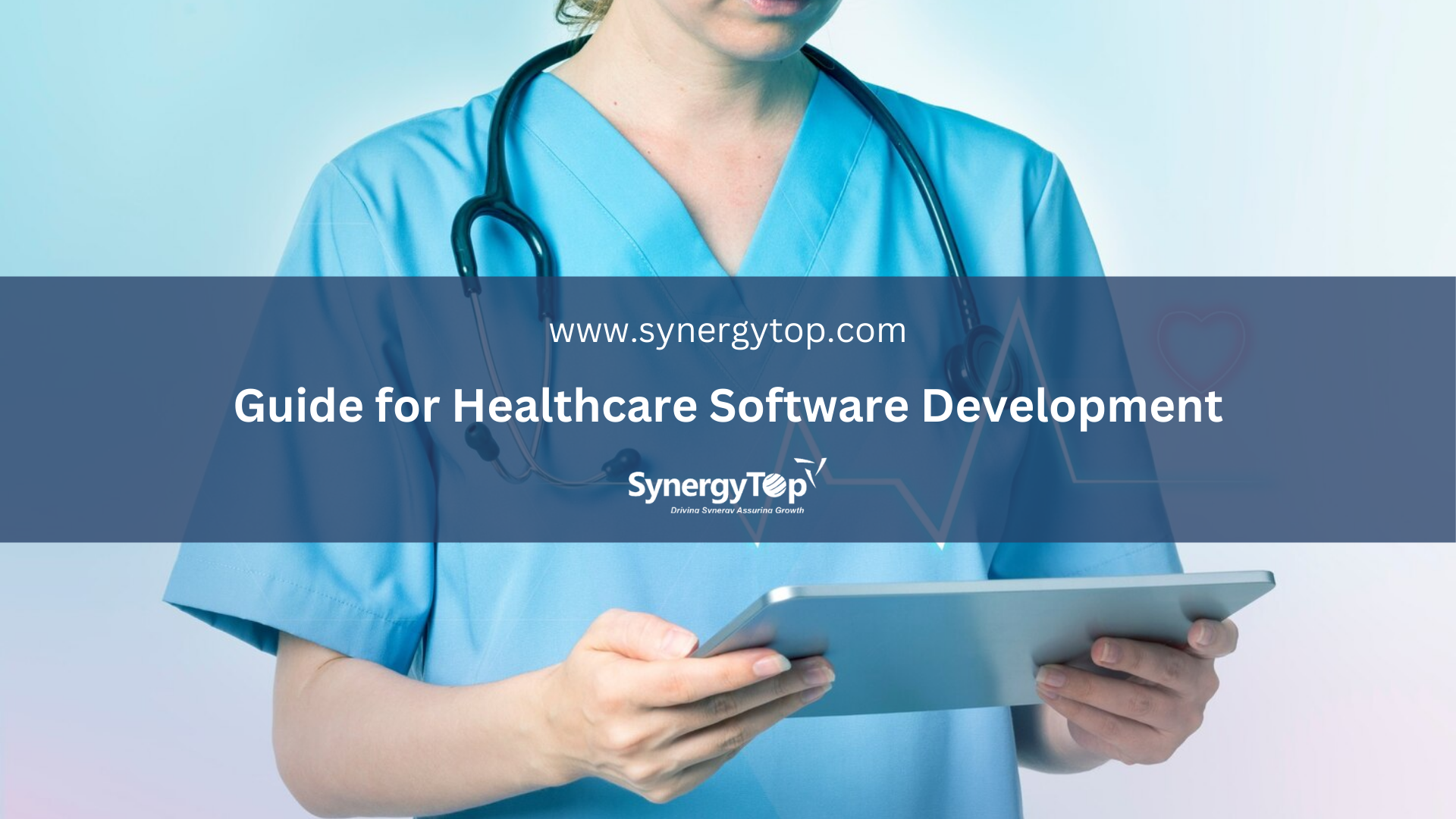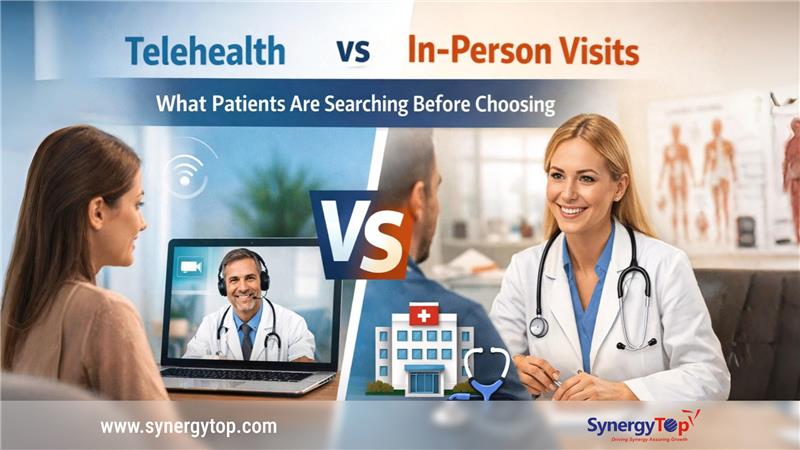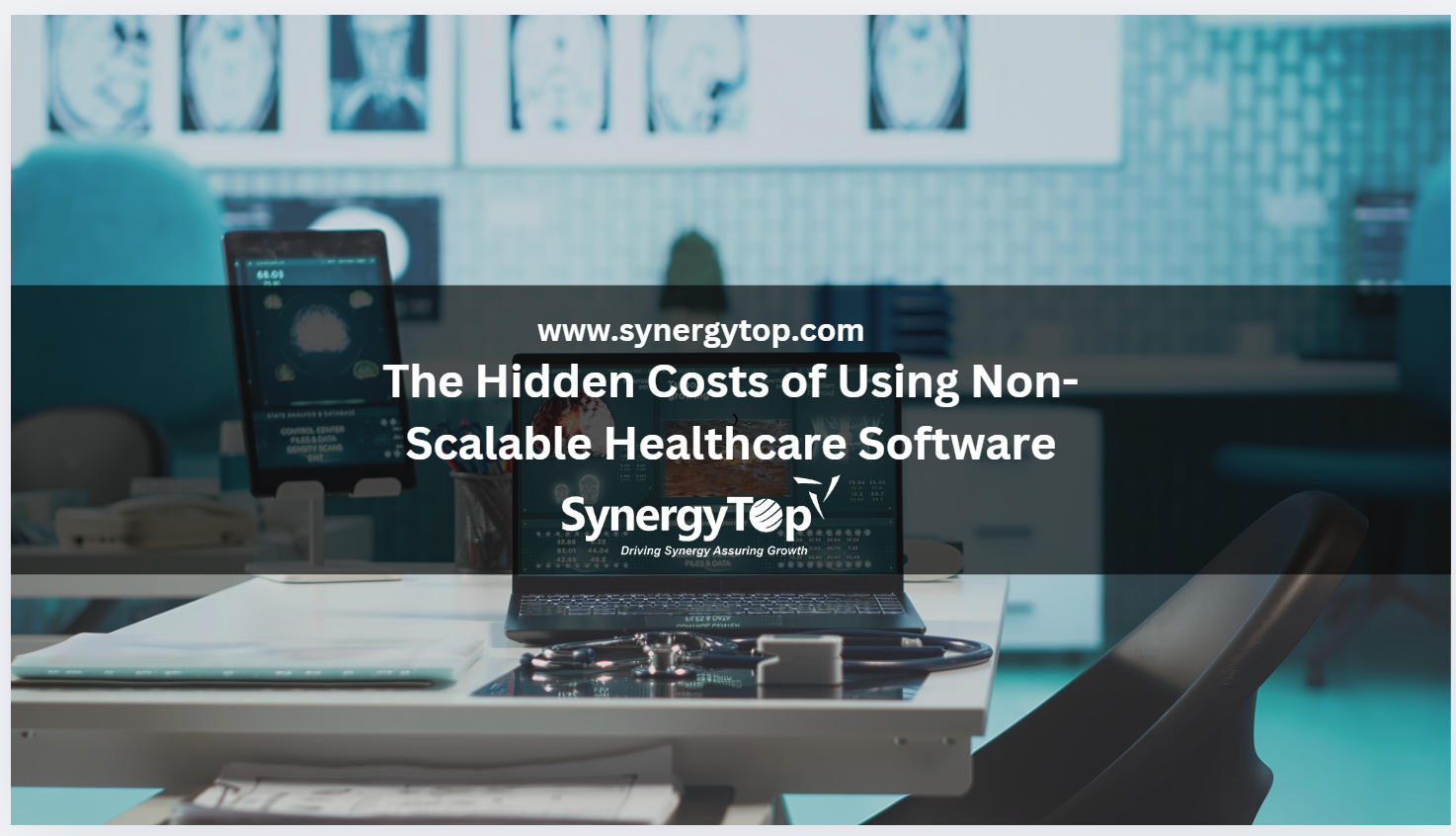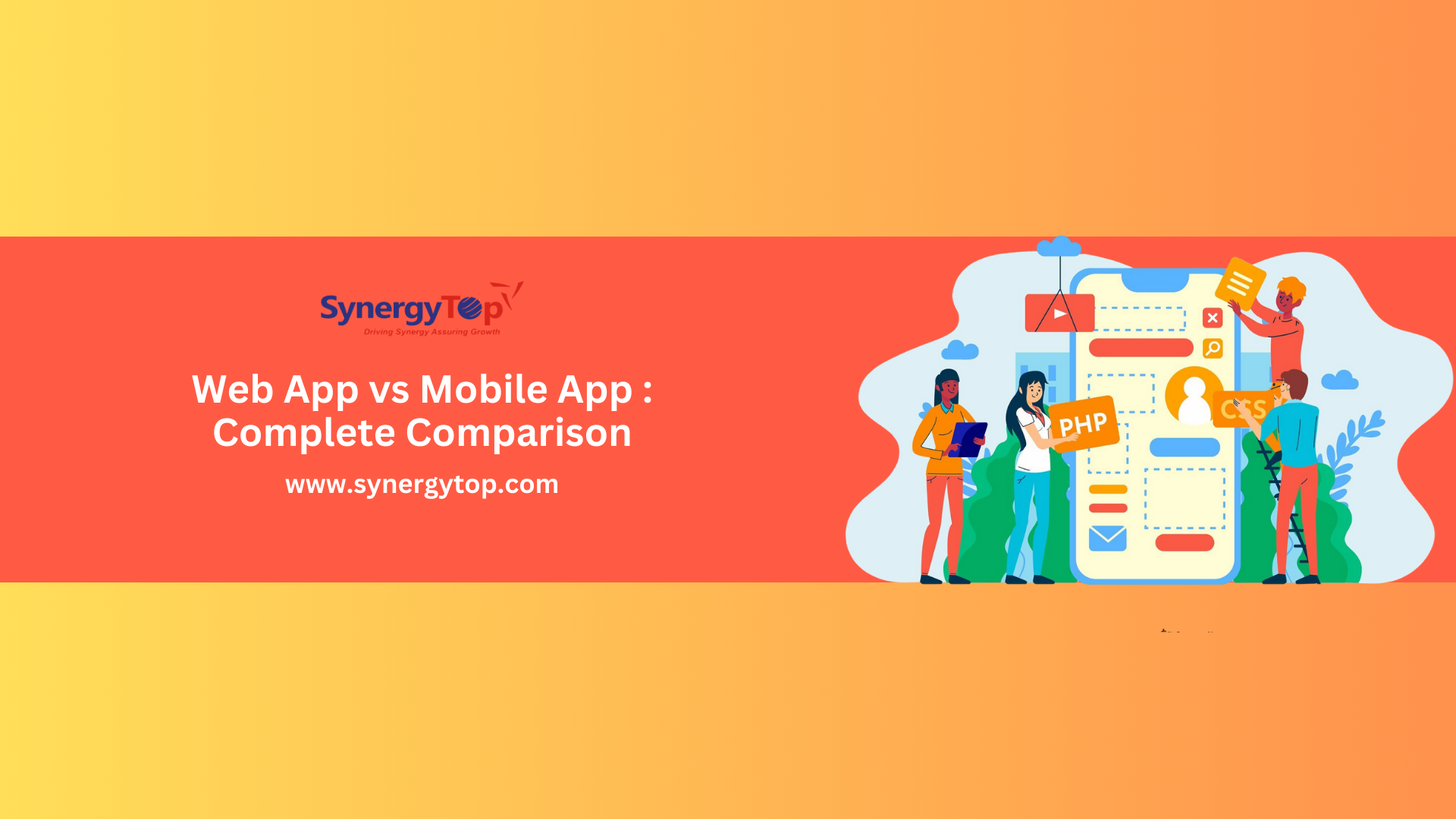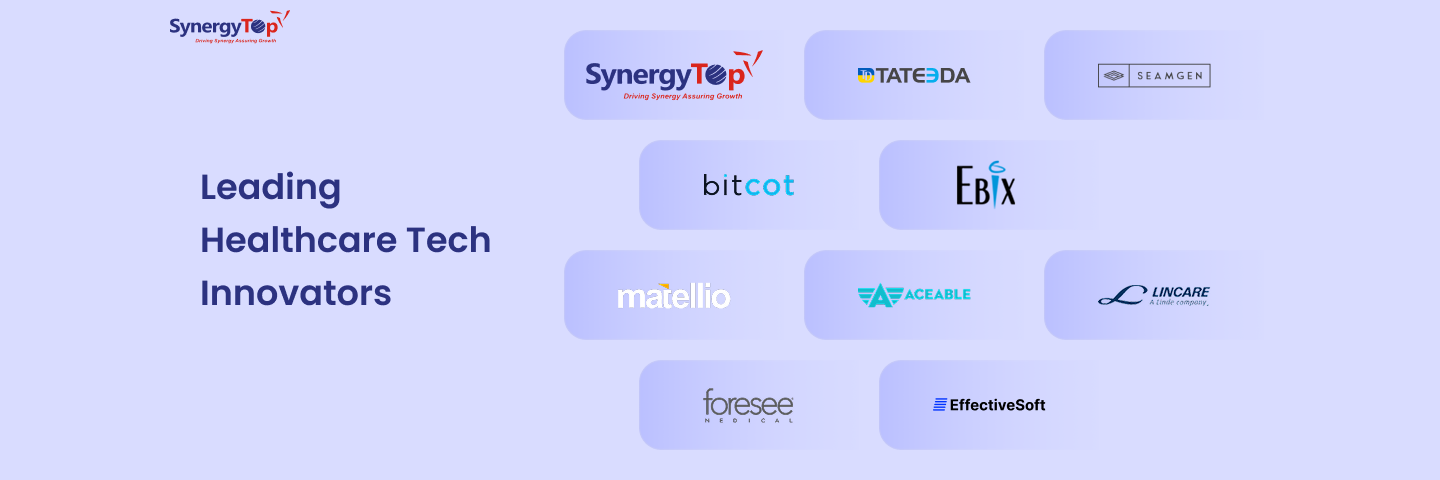Summary: The healthcare software development market is evolving. This comprehensive guide covers everything about custom healthcare software development in 2025. We walk you through the basics of software development in healthcare, trends, and more. Find all the information right here.
In 2022, the global healthcare IT market was valued at $394.6 billion. Within the next couple of years (by 2027) the market would be worth $974.5 billion. That’s a 19.8% CAGR.
However, the healthcare IT market wasn’t always growing at such a rapid pace.
It was the COVID-19 pandemic that reshaped the healthcare landscape. It was only after the pandemic that the adoption of digital solutions accelerated. This digitalization ensured continued care while minimizing exposure to risks.
Now, in 2025, custom healthcare software development has become important. Not just for the leading healthcare service providers, but all players in the market.
In this blog, we’ll cover everything you should know about healthcare software development. We’ll talk about:
- What is healthcare software development?
- Overview of the healthcare software development industry
- Benefits of custom healthcare software development
- Considerations around healthcare software development
- The healthcare software development process
- Must-have features in a custom healthcare software
- FAQs about software development in healthcare
What is Healthcare Software Development?
Healthcare software refers to a wide range of apps and systems that improve patient care. These systems streamline administrative tasks and enhance operational efficiency within healthcare settings.
Some examples of healthcare software include EHR, medical billing systems, and telemedicine platforms.
So healthcare software development is the process of getting these systems developed.
Explore the different types of healthcare software that can be developed using this process in our blog on types of healthcare software here.
An Overview of the Healthcare Software Development Industry
Since COVID-19 there has been a digital shift in the healthcare industry. The healthcare software development market is on the rise. Let us understand the healthcare software development industry in brief:
- The healthcare software market is growing
The global healthcare software market is expected to grow at an 18.5% CAGR between 2022 – 2030. - The adoption of AI and ML is increasing
By 2023, 94% of healthcare organizations were using or planning to use AI in their systems. The main aim of using AI was to improve patient care and operational efficiency. - Telehealth is expanding
The telehealth market is projected to grow from $87.41 billion in 2022 to $286.22 billion by 2030. The COVID-19 pandemic and ongoing digital transformation are clear drivers of this growth. - EHR integrations are on the rise
The Electronic Health Records (EHR) market is forecasted to reach $47.25 billion by 2027. This ensures better integration and interoperability. - Cybersecurity Concerns
In 2023, over 112 million people had their healthcare data exposed by more than 540 organizations. This makes healthcare cybersecurity a top concern when getting software developed.
With that, we have a fair idea of the custom software development industry. But why is the industry growing so rapidly? Well, the key reason is that custom software development services are extremely beneficial. They yield several positive outcomes for medical practitioners and healthcare organizations.
Let’s check out some of these benefits.
The Benefits of Custom Healthcare Software Development
There are hundreds (if not more!) of ff-the-shelf healthcare software solutions. Each of these solutions offers convenience, efficiency, and ease of use. Yet, custom software development for healthcare remains in demand. This is because custom healthcare software solutions are tailored to specific needs. Some of the benefits include:
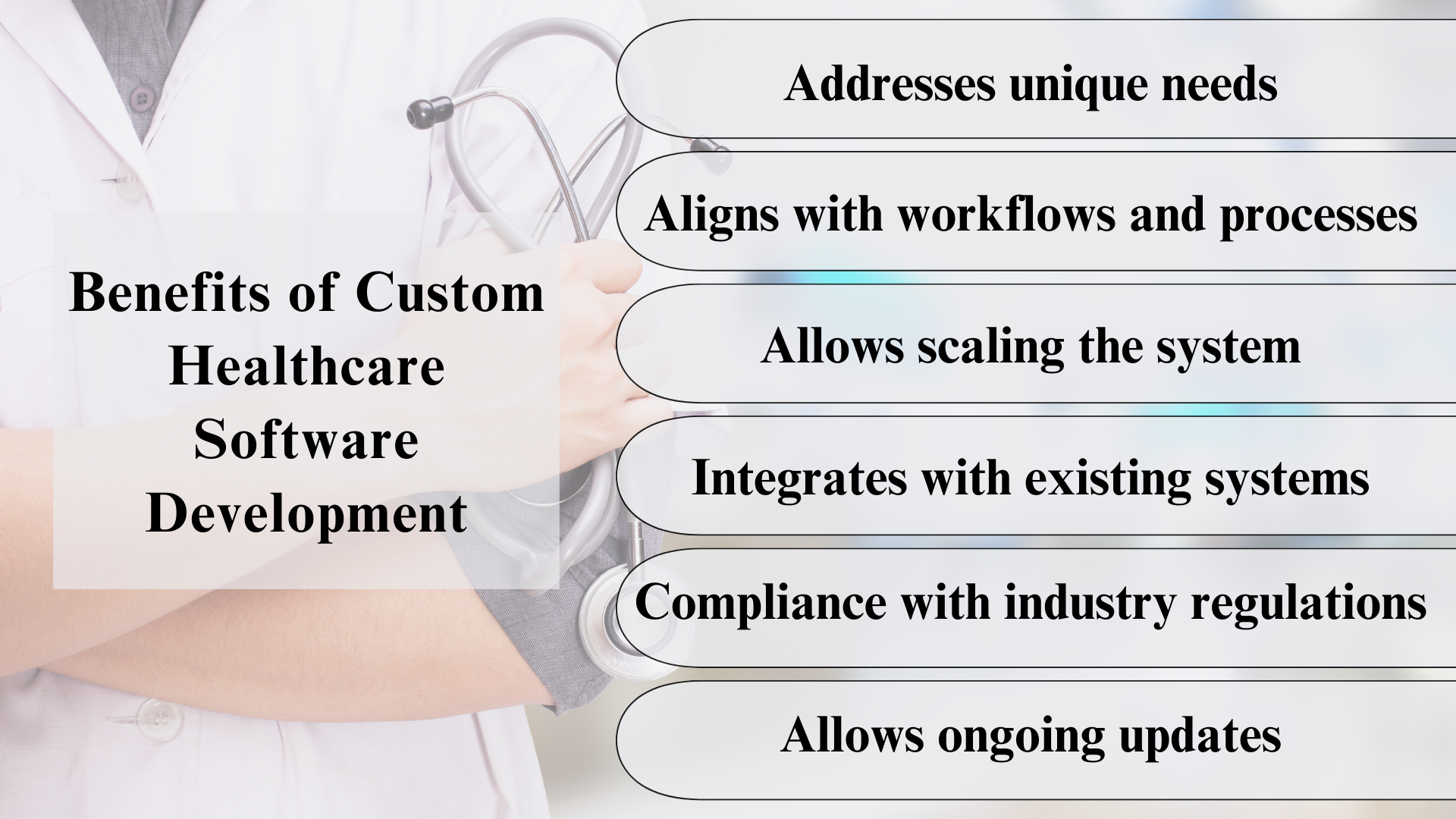
- Custom healthcare software addresses unique challenges and requirements within healthcare settings.
- Custom healthcare software aligns perfectly with the workflows and processes of healthcare providers. This not only enhances operational efficiency but also boosts user satisfaction.
- Custom healthcare software development allows scaling the system according to the organization’s growth. It can easily accommodate increased patient volumes and expanding service offerings. Without significant disruptions or cost considerations.
- Custom development ensures that the software seamlessly integrates with existing systems and technologies. This facilitates data interoperability and improves overall system efficiency.
- Custom healthcare software ensures compliance with industry regulations (e.g., HIPAA). This ensures robust protection of sensitive patient data.
- Healthcare environments are dynamic. Custom software allows for ongoing updates and modifications to meet evolving requirements.
These benefits clearly underscore the need for custom software development services.
However, healthcare software development isn’t without its fair share of considerations. Knowing these considerations and acting upon on them is necessary to ensure desirable results.
Considerations for Custom Healthcare Software Development
Custom healthcare software offers tailored solutions to meet specific needs. However, successful development requires careful consideration of several key factors.
-
Technological Expertise
Make sure your custom healthcare software development company is technically sound. The service provider shouldn’t just have expertise in relevant technologies but also compliances. For example, they should be experienced with:
- HIPAA-compliant databases,
- Interoperability standards (e.g., HL7), and
- Secure cloud solutions.
This is a must to ensure data privacy and regulatory compliance.
-
Industry Knowledge
Custom software development in healthcare doesn’t just include coding and deployment. It also requires deep industry understanding. Your developers should understand industry basics like:
- Healthcare workflows,
- Regulatory requirements (e.g., HIPAA, GDPR), and
- Best practices for patient data handling.
Only then can they build software that aligns with your needs and enhances patient care.
-
Industry Experience
Knowing something on paper isn’t enough. Your custom healthcare software development company should have hands-on experience in your niche.
So find a partner with a track record of successful healthcare software development.
-
Scalability and Capacity
A healthcare software solution that doesn’t grow with your business isn’t good enough. So make sure that your solution is designed to scale. It should be able to:
- Securely accommodate increased data volumes,
- Sustain user traffic without performance issues
- Integrate with new technologies or systems without compromising performance or security.
-
Security Measures
Security is a top priority in healthcare software development. A good healthcare software is the one that:
- Implements robust security protocols and encryption methods,
- Has access controls to safeguard patient data against cyber threats, and
- Ensures complete compliance with healthcare regulations.
Also, regular audits and updates are essential to protect the system against evolving risks.
Addressing these considerations ensures successful custom healthcare software development. Such a system meets not just the current needs but also supports future growth.
Medical Software Development Process
Developing a medical software solution requires a structured approach. That’s the key to functionality, security, and compliance with healthcare regulations. Here’s a quick of the typical healthcare software development process:
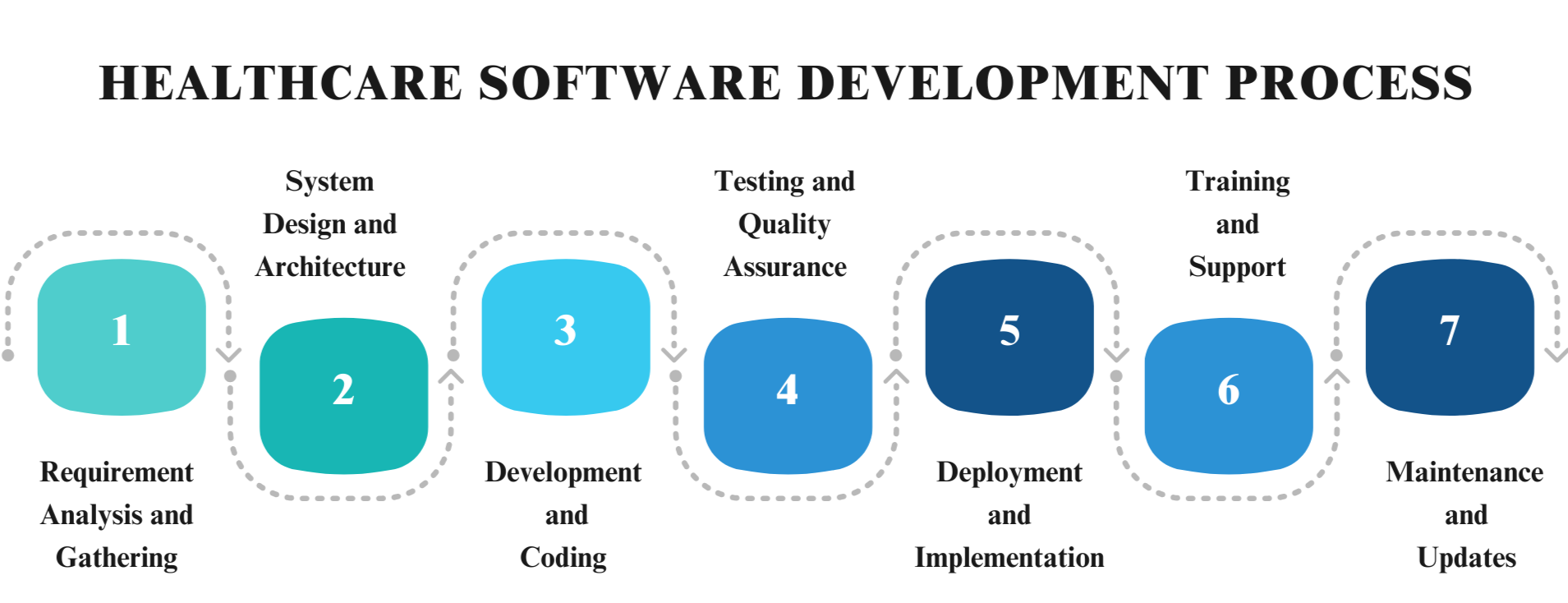
Collaboration between the client and the tech team is crucial throughout this process.
Must-Have Features in Custom Healthcare Software Development
There are many healthcare software solutions available in the market today. Each of these software solutions comes with its unique set of features. Also, when you get custom software developed, you can get robust features added.
However, there are certain must-have features in custom healthcare software solutions. Without these features, your healthcare software won’t be able to perform to its full potential.
Some of these features include:
| Feature | Description |
|---|---|
| Health Tracking | Monitor patient vitals and health metrics in real time. |
| Registration and Sign-In | Secure access for patients and healthcare professionals. |
| Appointment Scheduling and Reminder | Manage appointments efficiently with automated reminders. |
| Physician Information | Detailed profiles and specialties of healthcare providers. |
| Patient Information | Comprehensive records including medical history and treatment plans. |
| Geolocation | Locate nearby healthcare facilities and services. |
| Reviews and Ratings | Feedback system to assess healthcare provider performance. |
| Voice and Video Calls | Seamless communication between patients and providers. |
| Online Chat Support | Instant messaging for patient queries and support. |
| Payment Gateway | Secure processing for medical bills and services. |
| User Dashboard | Personalized interface for patients and providers. |
| Analytics | Data-driven insights for informed decision-making. |
| Photo Gallery | Visual documentation of medical images and scans. |
| Access to Information | Educational resources and medical knowledge base on diseases, patient history, and medicines. |
| Push Notifications | Alerts for appointments, medication reminders, and updates. |
| Wearable Integration | Sync data from wearable health devices. |
| Access to EHRs/EMRs | Electronic Health Records for comprehensive patient data. |
| Report Management | Storage and retrieval of medical reports and test results. |
| Cross-Device Accessibility | Use across desktop, mobile, and tablet platforms for convenience and accessibility. |
These features ensure the successful delivery of quality healthcare services via the software. But remember: you might not need all of these features in your custom healthcare software. A reliable healthcare software development company can help you identify the most important features.
Getting Started With Custom Healthcare Software Development
Custom healthcare software development can transform your organization. From improving patient care to streamlining operations, and ensuring compliance with industry standards; it can help achieve a lot.
Having understood the basics of healthcare software development, it’s time to take the next step. Turn your vision into reality with a custom healthcare software development company.
SynergyTop is one such company you can trust. At SynergyTop, we have a team that has the expertise and experience to guide you through this journey. Here’s why you should choose us:
- Extensive experience working with 15+ healthcare software projects
- 100% adherence to HIPAA and other crucial compliance standards
- A proven track record in delivering high-quality, custom solutions
Don’t wait to enhance your healthcare services with cutting-edge software. Schedule a meeting with SynergyTop’s healthcare software developers today.
FAQs


